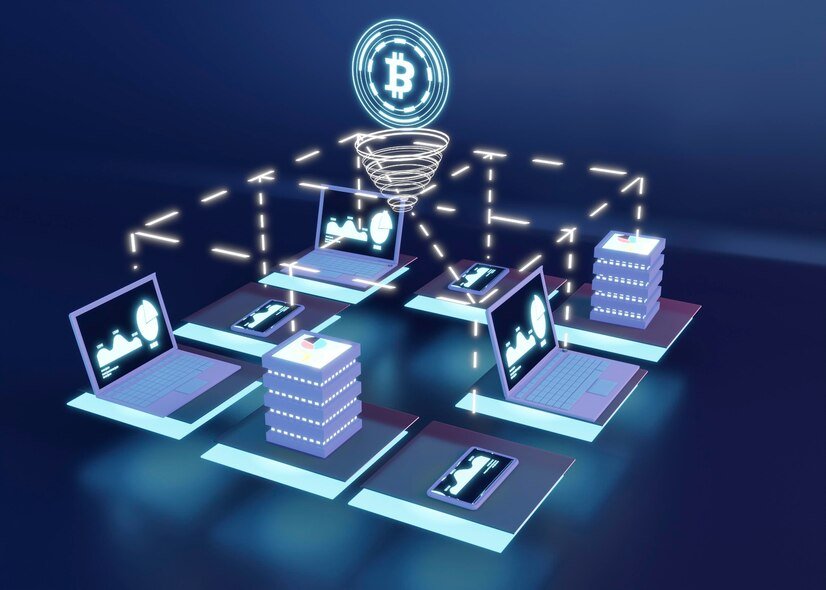Blockchain development has emerged as maybe of the most risky headway lately, particularly in the area of money related organizations. At first made as the secret advancement behind Bitcoin, blockchain has fostered quite far past its hidden explanation. Today, it is changing the fintech business by redesigning security, diminishing expenses, extending straightforwardness, and dealing with the capability of money related trades. This article examines how blockchain is disturbing fintech and the greater money related organizations region, highlighting its impact on portions, security, consistence, and financial thought.
Blockchain In Fintech
blockchain in fintech is changing the fintech business by giving a protected, decentralized framework for monetary exchanges. Not at all like conventional financial frameworks that depend on focal specialists, blockchain empowers shared exchanges, decreasing the gamble of misrepresentation and limiting exchange costs. Its straightforwardness guarantees that all exchanges are recorded on an unchanging record, making it almost difficult to change or alter the information.
As well as working with quicker and less expensive installments, blockchain is additionally upgrading the effectiveness of cycles like cross-line moves, clearing and settlement, and exchange finance. By empowering brilliant agreements, blockchain robotizes and smoothes out complex monetary arrangements, diminishing authoritative expenses and working on generally speaking functional effectiveness. This groundbreaking innovation is driving development in regions like cryptographic forms of money, computerized resources, and decentralized finance (DeFi), flagging a significant change in store for monetary administrations.
Financial Transactions
Monetary exchanges have gone through huge change as of late, determined by progressions in innovation. Conventional strategies, like money and checks, are progressively being supplanted by advanced installment frameworks, which offer more prominent speed, comfort, and security. Today, shoppers and organizations can finish exchanges utilizing versatile wallets, contactless cards, or digital money, working with consistent installments across lines and time regions. Blockchain innovation further upgrades monetary exchanges by giving secure, straightforward, and carefully designed records, lessening the gamble of misrepresentation and human blunder.
Besides, fintech improvements like shared portion stages and flexible financial applications have made money related trades more open, allowing clients to move saves, cover charges, or contribute at the hint of a button. This financial transactions headway is changing how individuals and associations administer cash, making financial trades speedier, safer, and more useful.
Decentralized Finance
Decentralized Cash (DeFi) is a momentous thought in the fintech space that impacts blockchain advancement to offer financial sorts of help without contingent upon standard center individuals like banks, delegates, or fall backs. DeFi stages enable clients to get to a considerable number of financial things, including crediting, getting, trading, and yield developing, all through sagacious agreements on blockchain networks like Ethereum. By killing the necessity for concentrated control, DeFi offers more unmistakable straightforwardness, diminished costs, and extended receptiveness to financial organizations.
Clients can participate in dispersed trades, obtain income on mechanized assets, and access propels without the necessity for credit checks or banks. This financial natural framework progresses money related influence, allowing individuals to control their own assets and trades, regardless of what their geographic region or financial establishment. With the improvement of DeFi, the financial scene is ending up being more far reaching, opening up new entryways for individuals and associations to partake in an around the world, decentralized money related structure.

What is Blockchain Innovation?
At its middle, blockchain is a distributed record development that licenses data to be taken care of across an association of laptops, called centers, rather than being taken care of in a bound together informational index. Each “block” contains an overview of trades, and when a block is done, it is associated with the past block, molding a relentless chain. This plan ensures that all data is perpetual and clear, making it unfathomably hard to change or screw with information at whatever point it is recorded.
One of the vital elements of blockchain is decentralization. Dissimilar to conventional financial frameworks, which depend on focal specialists to confirm and handle exchanges, blockchain works on a shared organization, implying that exchanges are approved by the actual organization. This kills the requirement for middle people, decreasing both the time and cost related with monetary exchanges.
Blockchain’s Effect on Installments and Cross-Line Exchanges
One of the most significant ways blockchain is reforming fintech is in the domain of installments. Conventional installment frameworks, especially for cross-line exchanges, are frequently sluggish, exorbitant, and powerless against misrepresentation. Installments can require a few days to process, particularly when middle people like journalist banks are involved. Moreover, money changes, expenses, and consistence really looks at add intricacy to the interaction, making worldwide installments an exorbitant and tedious undertaking.
Also, blockchain takes into consideration direct shared installments, bypassing customary monetary foundations altogether. This distributed usefulness empowers people to send assets to anybody on the planet without expecting to go through a bank, essentially bringing the obstructions down to passage for cross-line installments. Digital currencies, like Bitcoin and Ethereum, are additionally assuming a key part in changing installments, considering secure, quick exchanges that are not attached to a specific nation or focal power.
Blockchain and Security in Monetary Exchanges
One of the principal worries in the monetary administrations industry has forever been security. Customary monetary frameworks are inclined to hacking, misrepresentation, and information breaks, with delicate client data being put away in concentrated data sets that are powerless against digital assaults. Blockchain innovation offers an answer by giving an exceptionally solid climate to monetary exchanges.
Since blockchain works on a decentralized organization, there is no weak link. Every exchange is approved by an organization of PCs, and whenever it is kept in a block, it can’t be changed or erased. The straightforwardness of blockchain likewise guarantees that all exchanges are noticeable to all members, giving an extra layer of responsibility and lessening the probability of extortion.
Blockchain in Loaning and Getting
Loaning and getting are essential parts of the monetary framework, yet the conventional cycles frequently imply huge managerial above and chance. Blockchain innovation is changing these cycles by empowering shared loaning stages, which sidestep conventional mediators like banks and loaning foundations.
Blockchain-based loaning stages additionally take into consideration the formation of decentralized finance (DeFi) environments, where borrowers and banks can cooperate straightforwardly. DeFi stages permit people to get to credits involving guarantee as advanced resources like cryptographic forms of money. These stages use blockchain to guarantee that advances are gotten, diminishing the gamble for loan specialists and giving borrowers more available subsidizing choices.

Blockchain’s Job in Administrative Consistence
Administrative consistence is a basic part of the monetary administrations industry, yet it is likewise one of the most complicated and exorbitant. Monetary organizations are expected to follow a scope of guidelines, including hostile to tax evasion (AML), know your client (KYC), and charge regulations. Guaranteeing consistence frequently requires critical assets and time, and inability to consent can bring about robust fines and legitimate repercussions.
For KYC and AML purposes, blockchain innovation can smooth out character confirmation by permitting people to keep up with command over their own information. Blockchain-based character arrangements guarantee that main confirmed people can get to monetary administrations, diminishing the gamble of misrepresentation and tax evasion. In addition, blockchain can be utilized to follow the development of assets across networks, giving more noteworthy perceivability and decreasing the possibilities of illegal exercises going undetected.
Blockchain and Monetary Consideration
One of the main ways blockchain is changing fintech is by working on monetary consideration. An enormous part of the worldwide populace remains unbanked or underbanked, lacking admittance to customary financial administrations because of variables like geographic area, destitution, or absence of documentation. Blockchain innovation offers a potential chance to carry monetary administrations to these underserved populaces, permitting them to get to many monetary items without depending on conventional monetary establishments.
In countries with unstable or inflationary financial structures, blockchain-based electronic financial structures like Bitcoin and stablecoins offer a more trustworthy choice as opposed to standard government provided kinds of cash. These mechanized money related principles outfit individuals with a store of critical worth that isn’t reliant upon comparable risks as neighboring financial structures, engaging more essential money related reliability and security.
The Eventual fate of Blockchain in Fintech
As blockchain advancement continues to create, its capacity to change fintech is ending up being all the more clear. The financial organizations industry is logically embracing blockchain-based deals with any consequences regarding smooth out exercises, reduce costs, and further foster security. Major financial associations are exploring blockchain for applications going from portions and repayments to trade cash and asset the chiefs.
In addition, the combination of blockchain with other arising advances, like man-made reasoning (man-made intelligence) and the Web of Things (IoT), could additionally improve the capacities of monetary administrations. For instance, blockchain could be utilized to get information created by IoT gadgets, empowering new sorts of mechanized monetary exchanges and plans of action.
Conclusion
Blockchain innovation is without a doubt one of the main developments in the fintech area, with the possibility to change how monetary administrations are conveyed, got to, and consumed. By giving a protected, straightforward, and decentralized system for exchanges, blockchain is empowering quicker, more productive, and savvy monetary administrations. From installments and loaning to administrative consistence and monetary consideration, blockchain is tending to probably the most squeezing difficulties confronting the monetary business today.


